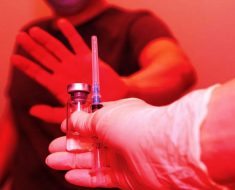Frankie Foster advises followers not to take diet supplements
We use your sign-up to provide content in ways you’ve consented to and to improve our understanding of you. This may include adverts from us and 3rd parties based on our understanding. You can unsubscribe at any time. More info
Supplements offer wide-ranging benefits which can bring significant improvements to some conditions. When taken at higher doses, however, they may pose certain risks. Nataly Komova, nutritionist and fitness expert at JustCBD, breaks down which three supplements are related to a greater risk of developing cancer.
Beta-carotene
Beta-carotene converts into vitamin A in the body, which can offer benefits for vision and eye health, as well as healthy skin and mucous membrane.
Nataly explained: “Beta-carotene is a dietary supplement advertised as best for our immune systems.
“However, missing the right doses of the supplement can increase skin cancer risks.”
One study of 29,999 male smoking found that participants who took 20mg of beta-carotene daily for five to eight years saw an 18 percent increase in their risk of lung cancer.
READ MORE: Supplements warning: The vitamin linked to a 22% increased risk of bleeding in the brain

However, foods that are rich in beta-carotene are considered beneficial for health, as they appear to lower the risk of some types of cancer, and possibly heart disease.
Vitamin E
Vitamin E is a key fat-soluble vitamin known to protect fats in cell membranes from damage caused by oxidation.
It is particularly important for maintaining a healthy heart and circulation, skin, nerves, muscles and red blood cells.
Nataly said: “Supplement with vitamin E is a great way to achieve healthy skin and brain.
“The vitamins also help strengthen our immune systems, protecting us from illness.
“However, at higher doses, vitamin E supplements increase the odds of contracting prostate cancer.”
Doctor Carrie Ruxton, from the Health & Food Supplements Information Service, explained that the purpose of supplements is to prevent disease, but rather to bridge dietary gaps.
Doctor Ruxton added: “Vitamin E intake is not measured in the current UK National Diet & Nutrition Survey, but it is estimated that more than 90 percent of people in the US do not consume enough vitamin E to meet their average daily needs.

“This includes a requirement amongst some group of people to take supplement vitamin E to bridge the dietary gap and achieve their daily requirements.”
Folic acid
Folic is generally used for preventing and treating low levels of folate and high blood levels of homocysteine.
In a 2009 study published in the Journal of the American Medical Association, researchers found that folic acid taken in large doses may promote some cancers.
The study, led by Marta Ebbing, of Norway Haukeland University Hospital, drew the conclusion after analysing data from almost 700 heart patients treated with B vitamin supplements.

The findings revealed that folic and B12 supplementation was associated with a 21 percent increased risk for cancer, and a 38 percent increased risk for dying from the disease.
Nataly noted: “Folic acid is an artificial vitamin B9 we consume for healthy red blood cells.
“However, excessive consumption of this supplement sets the stage for colon cancer.
“The bottom line is these supplements are healthy when taken in the right doses.”
Source: Read Full Article





